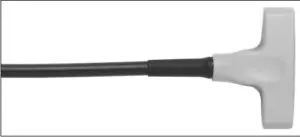T-Shaped IntraoperativeTransducer
BK MEDICALMileparken 342730 HerlevDenmarkTel.:+45 4452 8100 / Fax:+45 4452 8199www.bkultrasound.comEmail: bkultrasound.com
If you have comments about the user documentation, please write to us at the email address above. Wewould like to hear from you.
BK Medical Customer Satisfaction
Input from our customers helps us improve our products and services. As part of our customer satisfaction program, we contact a sample of our customers a few months after they receive their orders.If you receive an email message from us asking for your feedback, we hope you will be willing to answer some questions about your experience buying and using our products. Your opinions are important to us. You are of course always welcome to contact us via your B-K Medical representative or by contacting us directly.
Introduction
This is the user guide for T-Shaped Intraoperative Transducer Type 8816 and must be used together with Transducer Care, Cleaning & Safety which containsimportant safety information.The 8816 is an intraoperative transducer suitable for ultrasound-guided interventional procedures.
WARNINGDo not use the transducer for applications where it may come in direct conductive contact with the patient’s heart.

Figure 1. T-Shaped Intraoperative Transducer Type 8816.
Scanning Plane

General Information
Product specifications for this transducer can be found in the Product Data sheet that accompanies this user guide.
Acoustic output data and data about EMC (electromagnetic compatibility) for this transducer are on the Technical Data CD that accompanies this user guide. A full explanation of acoustic output is given in your scanner user guide.
WARNINGIf at any time the scanner malfunctions, or the image is severely distorted or degraded, oryou suspect in any way that the scanner is not functioning correctly:
- Remove all transducers from contact with the patient.
- Turn off the scanner. Unplug the scanner from the wall and make sure it cannot beused until it has been checked.
- Do not remove the scanner cover.
- Contact your B-K Medical representative or hospital technician..
WARNINGAlways keep the exposure level (the acoustic output level and the exposure time) as low as possible.
Caring for the TransducerThe transducer may be damaged during use or processing, so it must be checked before use for cracks or irregularities in the surface. It should also be checked thoroughly once a month following the procedure in Care, Cleaning & Safety.
Cleaning and DisinfectionTo ensure the best results when using BK Medical equipment, it is important to maintain a strict cleaning routine. Full details of cleaning and disinfection procedures can be found in Care, Cleaning & Safety that accompanies this user guide. A list of disinfectants and disinfection methods that the transducer can withstand are listed in the Product Data sheet. Sterile cover is available. See the Product Data sheet for more details.
WARNINGKeep all plugs and sockets absolutely dry at all times.
The transducer is connected to the scanner using the array Transducer Socket on the scanner. To connect, the transducer plug’s locking lever should first be in a horizontal position. Align the plug to the scanner socket and insert securely. Turn the locking lever clockwise to lock in place.
When connected, the transducer complies with Type BF requirements of EN60601-1 (IEC 60601-1).
Changing Frequency
The Multi-Frequency Imaging (MFI) facility enables you to select the scanning frequency. See the applicable scanner user guide for instructions. The selected frequency is displayed at the top of the screen.
Using a Transducer Cover
The transducer should be enclosed in a transducer cover or a standard condom. See the Product Data sheet for a list of available transducer covers.Note: Sterile, disposable sheaths are recommended for intra operative use. In the United States of America, it is recommended that probe sheaths have been market cleared. In Canada, use only licensed probe sheaths.
WARNINGBecause of reports of severe allergic reactions to medical devices containing latex ( natural rubber), FDA is advising health-care professionals to identify their latex-sensitive patients and be prepared to treat allergic reactions promptly.
Note: For Intraoperative ApplicationsApply sterile gel to the tip of the transducer or fill the cover with 1 to 2ml of sterile water. This improves the screen images by preventing mage artifacts caused by air bubbles.Pull the transducer cover over the transducer.
WARNINGUse only water-soluble agents or gels. Petroleum or mineral oil-based materials may harm the cover materials.
Changing OrientationTo change the orientation of the image on the monitor, refer to the applicable scanner user guide for instructions.Holding the Transducer for Intraoperative ScanningHold the transducer between two fingers and the thumb (see Figure 3) or any position which is comfortable for your hand and move the transducer smoothly over the surface of the organ to produce the best screen image.

Figure 3. Holding 8816 for scanning
Disposal
When the transducer is scrapped at the end of its life, national rules for the relevant material in each individual land must be followed. Within the EU, when you discard the transducer, you must send it to appropriate facilities for recovery and recycling. See the applicable scanner user guide for further details.
WARNINGFor contaminated disposals such as transducer covers or needle guides, follow disposal control policies established for your office, department or hospital.
BK Ultrasound T-Shaped Intraoperative Transducer User Manual – BK Ultrasound T-Shaped Intraoperative Transducer User Manual –
[xyz-ips snippet=”download-snippet”]
